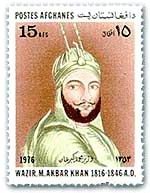Wazir Akbar Khan: Difference between revisions
| Line 43: | Line 43: | ||
==In fiction== |
==In fiction== |
||
{{grammar}} |
|||
{{cleanup}} |
|||
The historical figure of Akbar Khan plays a major role in [[George MacDonald Fraser]]'s novel ''[[Flashman (novel)|Flashman]]. |
The historical figure of Akbar Khan plays a major role in [[George MacDonald Fraser]]'s novel ''[[Flashman (novel)|Flashman]]. |
||
No factual reference base for killing of Sardar Hari Singh Nalwa, however the ''Peshwar Gazzette'' of 1897 clearly shows that gulab singh Hindu dogra, forgave the tax owed by yar Mohamed barukzai which sardar hari singh had originally come to collect, it is also written by a kin of the dogras that hari singh stood in the way of dogra ruling dream so while during chase of the retreating armies of Kabul he was shot in the back fact by gulab singh's man, another fact the Afghans in the siege were repulsed and unsuccessful. |
No factual reference base for killing of Sardar Hari Singh Nalwa, however the ''Peshwar Gazzette'' of 1897 clearly shows that gulab singh Hindu dogra, forgave the tax owed by yar Mohamed barukzai which sardar hari singh had originally come to collect, it is also written by a kin of the dogras that hari singh stood in the way of dogra ruling dream so while during chase of the retreating armies of Kabul he was shot in the back fact by gulab singh's man, another fact the Afghans in the siege were repulsed and unsuccessful. |
||
Revision as of 12:34, 23 May 2012
| Amir Akbar Khan امير اکبر خان | |
|---|---|
| Emir of Afghanistan | |
 Amir Akbar Khan امير اکبر خان | |
| Reign | 1842–1845 |
| Predecessor | Shuja Shah Durrani |
| Successor | Amir Dost Mohammad Khan |
| Born | 1816 |
| Died | 1845 Jalalabad, Afghanistan |
| Burial | |
| House | Barakzai dynasty |
| Father | Amir Dost Mohammad Khan |
| Mother | Mirmon Khadija Popalzai |
| Religion | Sunni Islam |

Amir Akbar Khan (1816–1845;Template:Lang-ps, born as Mohammad Akbar Khan (Template:Lang-ps) and famously known as Wazir Akbar Khan, was an Afghan Prince, a general, a tribal leader and Emir. He was active in the First Anglo-Afghan War, which lasted from 1839 to 1842. He is prominent for his leadership of the national party in Kabul from 1841 to 1842, and his pursuit of the retreating British army from Kabul to Gandamak near Jalalabad in 1842. In 1837 in the battle of Jamrud he killed sikh general Hari Singh Nalwa in a planned tyrantical way by conspiring whilst trying to get back the city of Peshawar for the Afghans from the Sikh army, but Akbar Khan failed to do so.
Early life
Amir Akbar Khan was born in the year 1816 as Mohammad Akbar Khan, as the son of Amir Dost Mohammad Khan of Afghanistan and to his fifth wife Mirmon Khadija Popalzai. Amir Dost Mohammad Khan had totally 2 wives, 8 sons (including Amir Akbar Khan) and 2 daughters.[1]
Adult life
He led a revolt in Kabul against the British Indian mission of William McNaughten, Alexander Burnes and their garrison of 4,500 men. In November 1841, he besieged Major-General William Elphinstone's force in Kabul. Elphinstone accepted a safe-conduct for his force and about 12,000 associated workers to flee to India; they were ambushed and massacred. It was claimed in at least one set of British war memoirs that, during the retreat, Akbar Khan could be heard alternately commanding his men, in Persian language to desist from, and in Pashto language to continue, firing.[2]
Historians think it unlikely that Akbar Khan wished for the total annihilation of the British force. An astute man politically, he would have been aware that allowing the British to extricate themselves from Afghanistan would give him the time to consolidate his control of the diverse hill tribes; whereas a massacre of 16,500 people, of which only about a quarter were a fighting force, would not be tolerated back in London and would result in another, larger army sent to exact retribution. This was in fact what happened the following year.
Many believe that Akbar Khan was poisoned by his father, Dost Mohammed, who feared his ambitions.[3]
In fiction
This article may require copy editing for grammar, style, cohesion, tone, or spelling. |
You must add a |reason= parameter to this Cleanup template – replace it with {{Cleanup|reason=<Fill reason here>}}, or remove the Cleanup template.
The historical figure of Akbar Khan plays a major role in George MacDonald Fraser's novel Flashman.
No factual reference base for killing of Sardar Hari Singh Nalwa, however the Peshwar Gazzette of 1897 clearly shows that gulab singh Hindu dogra, forgave the tax owed by yar Mohamed barukzai which sardar hari singh had originally come to collect, it is also written by a kin of the dogras that hari singh stood in the way of dogra ruling dream so while during chase of the retreating armies of Kabul he was shot in the back fact by gulab singh's man, another fact the Afghans in the siege were repulsed and unsuccessful.
References
- ^ Christopher Buyers. "Afghanistan, The Barakzai dynasty, genealogy". The Royal Ark. Retrieved 2011-06-10.
- ^ Hopkirk, Peter. The Great Game. Oxford University Press, (1990), p263-264, ISBN 0-19-282799-5.
- ^ "Biography: Mohammad Akbar Khan". Afghanistan Online. 2001. Retrieved 5 December 2006.
